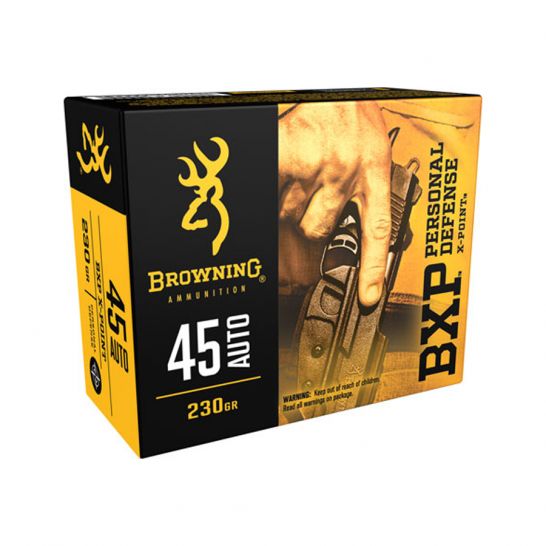Browning .45 ACP BXP 230gr JHP 20rds – B191700451 For Sale
$23.99
What is 45 ACP JHP ammo?
.45 ACP JHP ammo refers to a specific type of ammunition used in firearms. Here’s a breakdown of the terms:
– **.45 ACP**: This stands for .45 Automatic Colt Pistol, a popular caliber of ammunition designed by John Browning in the early 20th century. It is widely used in various pistols, most notably the M1911.
– **JHP**: This stands for Jacketed Hollow Point. This type of bullet has a hollowed-out center at the tip and is covered by a jacket, typically made of copper. The design aims to expand upon impact, increasing the diameter of the bullet and causing more damage to the target. This expansion helps to stop a threat more effectively and reduces the risk of over-penetration, making JHP a popular choice for self-defense and law enforcement purposes.
In summary, .45 ACP JHP ammo is a .45 caliber automatic Colt pistol ammunition with a jacketed hollow point design, valued for its stopping power and reduced risk of collateral damage.
What ammo does the Browning pistol use?
The Browning pistol, particularly the Browning Hi-Power, typically uses 9mm ammunition. However, other Browning models may use different calibers, so the specific model is important for an accurate answer.
Is 45 ACP stronger than 9mm?
The .45 ACP and 9mm are both popular handgun cartridges, but they differ in several ways:
1. **Recoil and Size**:
– The .45 ACP generally has more recoil due to its larger size and heavier bullet. It fires a heavier and larger diameter bullet (.451 inches) compared to the 9mm (.355 inches).
– The 9mm typically has a higher velocity and less recoil, making it easier to shoot quickly and more accurately for most users.
2. **Stopping Power**:
– The .45 ACP is often considered to have greater stopping power due to its larger, heavier bullet, which can create a larger wound channel.
– The 9mm relies more on velocity and can carry more rounds in the same size magazine, which some argue offers a practical advantage.
3. **Capacity**:
– 9mm handguns generally have a higher magazine capacity due to the smaller size of the cartridge.
– .45 ACP pistols typically hold fewer rounds, as the larger cartridge takes up more space.
4. **Penetration and Versatility**:
– Modern 9mm ammunition, especially premium self-defense rounds, can offer excellent penetration and expansion, rivaling the stopping power of the .45 ACP.
– Both cartridges have a wide range of ammunition types available for different purposes.
In summary, whether the .45 ACP is “stronger” than the 9mm can depend on the context—such as desired stopping power, recoil preference, and capacity needs. While the .45 ACP has a reputation for delivering powerful hits, the 9mm offers advantages in capacity, control, and versatility with modern ammunition technology.
Does Browning make a good pistol?
Browning is known for producing high-quality firearms, and many of their pistol models are highly regarded by enthusiasts and experts. The Browning Hi-Power, for example, is a classic design that has been praised for its reliability, accuracy, and ergonomics. Overall, Browning pistols are generally considered to be well-made and reliable, making them a good choice for many users. However, individual preferences and needs can vary, so it’s always a good idea to handle and, if possible, try a firearm before purchasing to ensure it meets your expectations.
Who makes ammo for Browning?
Browning ammunition is produced by Winchester. Winchester Ammunition manufactures a variety of ammo under the Browning brand, leveraging both companies’ reputations for quality and reliability in the firearms and ammunition industry.
What does 230 grain bullet mean?
A 230 grain bullet refers to the weight of the bullet, which is 230 grains. In the context of ammunition, the term “grain” is a unit of measurement for mass, commonly used to specify the weight of bullets and gunpowder. One grain is equivalent to approximately 1/7000th of a pound or 0.0648 grams. Therefore, a 230 grain bullet weighs about 14.9 grams or 0.52 ounces. This weight is often associated with certain types of ammunition, such as .45 ACP, which commonly uses 230 grain bullets.
What is the difference between 45 ACP JHP and FMJ?
The difference between .45 ACP JHP (Jacketed Hollow Point) and FMJ (Full Metal Jacket) lies primarily in their design and intended use:
1. **Jacketed Hollow Point (JHP):**
– **Design:** The bullet has a hollow cavity at its tip. This design is intended to expand upon impact with a target.
– **Purpose:** The expansion increases the stopping power and is ideal for personal defense as it creates larger wound channels, reducing the risk of over-penetration.
– **Performance:** JHP bullets are known for better energy transfer and are often used by law enforcement and for self-defense purposes.
2. **Full Metal Jacket (FMJ):**
– **Design:** The bullet is fully encased in a metal jacket, which helps it maintain its shape when traveling through targets.
– **Purpose:** FMJ rounds are commonly used for target practice and military applications because they penetrate well and are more economical for high-volume shooting.
– **Performance:** These rounds are less likely to expand and are more prone to over-penetration, making them less suited for defense but ideal for range use.
In summary, JHP is preferred for self-defense due to its expanding capability, while FMJ is favored for target practice and training due to its cost-effectiveness and consistent performance.
What are JHP rounds for?
JHP rounds, or jacketed hollow point rounds, are a type of ammunition designed primarily for self-defense and law enforcement purposes. The hollow point design causes the bullet to expand upon impact, which increases its diameter and effectiveness in incapacitating a target. This expansion also typically reduces the risk of over-penetration, minimizing potential collateral damage.

Reviews
There are no reviews yet.